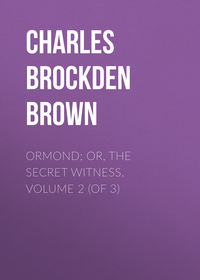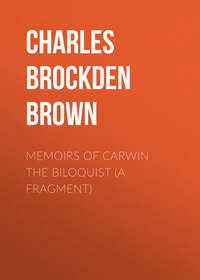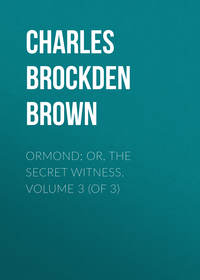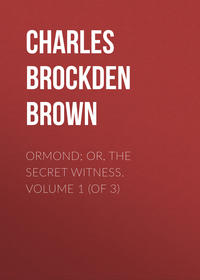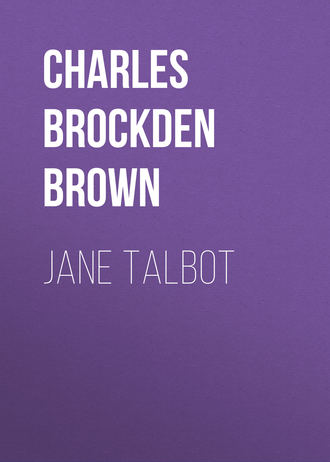 полная версия
полная версияJane Talbot
I want to see you. Can't you come again this evening? but no; you must not. I must not be an encroacher. I must judge of others, and of their claims upon your company, by myself and my own claims. Yet I should be glad to see that creature who would dare to enter into competition with me.
But I may as well hold my peace. My rights will not be admitted by others. Indeed, no soul but yourself can know them in all their extent, and, what is all I care for, you are far from being strictly just to me!
Don't be angry, Hal. Skip the last couple of sentences, or think of them as not mine: I disown them. To-morrow, at six, the fire shall be stirred, the candles lighted, and the sofa placed in order due. I shall be at home to nobody; mind that.
I am loath to mention one thing, however, but I must. Though nothing be due to the absent man, somewhat is due to myself. I have been excessively uneasy the whole day. I am terrified at certain consequences. What may not happen if–No; the last night's scene must not be repeated; at least for a month to come. The sweet oblivion of the future and past lasted only for the night. Now I have leisure to look forward, and am resolved (don't laugh at my resolves; I am quite in earnest) to keep thee at a distance for at least a fortnight to come. It shall be a whole month if thou dost not submit with a good grace.
JANE TALBOT.
Letter XVIII
To Mr. Henry ColdenNew York, October 22.
SIR:–
I address myself to you as the mother of an unhappy girl who has put herself into your power. But I write not to upbraid you or indulge my own indignation, but merely to beseech your compassion for her whom you profess to love.
I cannot apologize for the manner in which I have acted in regard to your connection with Jane Talbot. In that respect, I must take to myself all the blame you may choose to impute to me.
I call not into question the disinterestedness of your intentions in proposing marriage to this woman; nor, if the information which I am going to give you should possess any influence, shall I ascribe that influence to any thing but a commendable attention to your true interest, and a generous regard to the welfare of my daughter.
Be it known to you then, sir, that Mrs. Talbot possesses no fortune in her own right. Her present dwelling, and her chief means of subsistence, are derived from me: she holds them at my option; and they will be instantly and entirely withdrawn, on her marriage with you.
You cannot be unacquainted with the habits and views in which my daughter has been educated. Her life has passed in ease and luxury, and you cannot but perceive the effect of any material change in her way of life.
It would be a wretched artifice to pretend to any particular esteem for you, or to attempt to persuade you that any part of this letter is dictated by any regard to your interest, except as that is subservient to the interest of one whom I can never cease to love.
Yet I ardently hope that this circumstance may not hinder you from accepting bills upon London to the amount of three hundred pounds sterling. They shall be put into your hands the moment I am properly assured that you have engaged your passage to Europe and are determined to be nothing more than a distant well-wisher to my daughter.
I am anxious that you should draw, from the terms of this offer, proof of that confidence in your word which you might not perhaps have expected from my conduct towards you in other respects. Indeed, my conscience acquits me of any design to injure you. On the contrary, it would give me sincere pleasure to hear of your success in every laudable pursuit.
I know your talents and the direction which they have hitherto received. I know that London is a theatre best adapted to the lucrative display of those talents, and that the sum I offer will be an ample fund, till your own exertions may be turned to account.
If this offer be accepted, I shall not only hold myself everlastingly obliged to you, but I shall grant you a higher place in my esteem. Yet, through deference to scruples which you may possibly possess, I most cheerfully plight to you my honour, that this transaction shall be concealed from Mrs. Talbot and from all the world.
Though property is necessary to our happiness, and my daughter's habits render the continuance of former indulgences necessary to her content, I will not be so unjust to her as to imagine that this is all which she regards. Respect from the world, and the attachment of her ancient friends, are, also, of some value in her eyes. Reflect, sir, I beseech you, whether you are qualified to compensate her for the loss of property, of good name,–my own justification, in case she marries you, will require me to be nothing more than just to her,–and of all her ancient friends, who will abhor in her the faithless wife and the ungrateful child. I need not inform you that your family will never receive into their bosom one whom her own kindred have rejected. I am, &c.
H. FIELDER.
Letter XIX
To Mrs. FielderPhiladelphia, October 28.
I need not hesitate a moment to answer this letter. I will be all that my revered mamma wishes me to be. I have vowed an eternal separation from Colden; and, to enable me to keep this vow, I entreat you to permit me to come to you.
I will leave this house in anybody's care you direct. My Molly and the boy Tom I shall find it no easy task to part with; but I will, nevertheless, send the former to her mother, who is thrifty and well to live. I beg you to permit me to bring the boy with me. I wait your answer.
JANE TALBOT.
Letter XX
To Henry ColdenPhiladelphia, October 28.
O my friend! Where are you at this trying moment? Why did you desert me? Now, if ever, does my feeble heart stand in need of your counsel and courage.
Did I ever lean these throbbing brows against your arm and pour my tears into your bosom, that I was not comforted? Never did that adored voice fail to whisper sweet peace to my soul. In every storm, thy calmer and more strenuous spirit has provided me the means of safety. But now I look around for my stay, my monitor, my encourager, in vain.
You will make haste to despatch the business that detains you. You will return, and fly, on the wings of love, to thy Jane. Alas! she will not be found. She will have fled far away, and in her stead will she leave this sullen messenger to tell thee that thy Jane has parted from thee forever!
Do not upbraid me, Hal. Do not call me ungrateful or rash. Indeed, I shall not be able to bear thy reproaches. I know they will kill me quite.
And don't expostulate with me. Confirm me rather in my new resolution. Even if you think it cruel or absurd, aver that it is just. Persuade me that I have done my duty to my mother, and assure me of your cheerful acquiescence.
Too late is it now, even if I would, to recall my promise.
I have promised to part with you. In the first tumult of my soul, on receiving the enclosed letters, I wrote an answer, assuring Mrs. Fielder of my absolute concurrence with her will.
Already does my heart, calling up thy beloved image; reflecting on the immense debt which I owe to your generosity, on the disappointment which the tidings of my journey will give you; already do I repent of my precipitation.
I have sought repose, but I find it not. My pillow is moist with the bitterest tears that I ever shed. To give vent to my swelling heart, I write to you; but I must now stop. All my former self is coming back upon me, and, while I think of you as of my true and only friend, I shall be unable to persist. I will not part with thee, my friend. I cannot do it. Has not my life been solemnly devoted to compensate thee for thy unmerited love? For the crosses and vexations thou hast endured for my sake?
Why shall I forsake thee? To gratify a wayward and groundless prejudice. To purchase the short-lived and dubious affection of one who loves me in proportion as I am blind to thy merit; as I forget thy benefits; as I countenance the envy and slander that pursue thee.
Yet what shall I bring to thy arms? A blasted reputation, poverty, contempt, the indignation of mine and of thy friends. For thou art poor, and so am I. Thy kindred have antipathies for me as strong as those that are fostered against thyself–
JANE TALBOT.
Letter XXI
To Henry ColdenOctober 28, Evening.
I will struggle for sufficient composure to finish this letter. I have spent the day in reflection, and am now, I hope, calm enough to review this most horrid and inexplicable charge.
Look, my friend, at the letter she has sent me. It is my handwriting,–the very same which I have so often mentioned to you as having been, after so unaccountable a manner, mislaid.
I wrote some part of it, alone, in my own parlour. You recollect the time;–the day after that night which a heavy storm of rain and my fatal importunity prevailed on you to spend under this roof.
Mark the deplorable consequences of an act which the coldest charity would not have declined. On such a night I would have opened my doors to my worst enemy. Yet because I turned not forth my best friend on such a night, see to what a foul accusation I have exposed myself.
I had not finished, but it came into my mind that something in that which I had a little before received from you might be seasonably noticed before I shut up my billet. So I left my paper on the table, open, while I ran up-stairs to get your letter, which I had left in a drawer in my chamber.
While turning over clothes and papers, I heard the street-door open and some one enter. This did not hinder me from continuing my search. I thought it was my gossiping neighbour, Miss Jessup, and had some hopes that, finding no one in the parlour, she would withdraw with as little ceremony as she entered.
My search was longer than I expected; but, finding it at last, down I went, fully expecting to find a visitant, not having heard any steps returning to the door.
But no visitant was there, and the paper was gone! I was surprised, and a little alarmed. You know my childish apprehensions of robbers.
I called up Molly, who was singing at her work in the kitchen. She had heard the street-door open and shut, and footsteps overhead, but she imagined them to be mine. A little heavier, too, she recollected them to be, than mine. She likewise heard a sound as if the door had been opened and shut softly. It thus appeared that my unknown visitant had hastily and secretly withdrawn, and my paper had disappeared.
I was confounded at this incident. Who it was that could thus purloin an unfinished letter and retire in order to conceal the theft, I could not imagine. Nothing else had been displaced. It was no ordinary thief,–no sordid villain.
For a time, I thought perhaps it might be some facetious body, who expected to find amusement in puzzling or alarming me. Yet I was not alarmed: for what had I to fear or to conceal? The contents were perfectly harmless; and, being fully satisfied with the purity of my own thoughts, I never dreamed of any construction being put on them, injurious to me.
I soon ceased to think of this occurrence. I had no cause, as I then thought, to be anxious about consequences. The place of the lost letter was easily supplied by my loquacious pen, and I came at last to conjecture that I had carelessly whisked it into the fire, and that the visitant had been induced to withdraw, by finding the apartment empty. Yet I never discovered any one who had come in and gone out in this manner. Miss Jessup, whom I questioned afterwards, had spent that day elsewhere. And now, when the letter and its contents were almost forgotten, does it appear before me, and is offered in proof of this dreadful charge.
After reading my mother's letter, I opened with trembling hand that which was enclosed. I instantly recognised the long-lost billet. All of it appeared, on the first perusal, to be mine. Even the last mysterious paragraph was acknowledged by my senses. In the first confusion of my mind, I knew not what to believe or reject; my thoughts were wandering, and my repeated efforts had no influence in restoring them to order.
Methinks I then felt as I should have felt if the charge had been true. I shuddered as if to look back would only furnish me with proofs of a guilt of which I had not hitherto been conscious,–proofs that had merely escaped remembrance, or had failed to produce their due effect, from some infatuation of mind.
When the first horror and amazement were passed, and I took up the letter and pondered on it once more, I caught a glimpse suddenly; suspicion darted all at once into my mind; I strove to recollect the circumstances attending the writing of this billet.
Yes; it was clear. As distinctly as if it were the work of yesterday, did I now remember that I stopped at the words nobody; mind that. The following sentences are strange to me. The character is similar to what precedes, but the words were never penned by me.
And could Talbot–Yet what end? a fraud so–Ah! let me not suspect my husband of such a fraud. Let me not have reason to abhor his memory.
I fondly imagined that with his life my causes of disquiet were at an end; yet now are my eyes open to an endless series of calamities and humiliations which his decease had made sure.
I cannot escape from them. There is no help for me. I cannot disprove. What testimony can I bring to establish my innocence,–to prove that another hand has added these detestable confessions?
True it is, you passed that night under my roof. Where was my caution? You, Henry, knew mankind better than I: why did you not repel my importunities, and leave me in spite of my urgencies for your stay?
Poor, thoughtless wretch that I was, not to be aware of the indecorum of allowing one of your sex, not allied to me by kindred,–I, too, alone, without any companion but a servant,–to pass the night in the same habitation!
What is genuine of this note acknowledges your having lodged here. Thus much I cannot and need not deny: yet how shall I make those distinctions visible to Mrs. Fielder? how shall I point out that spot in my billet where the forgery begins? and at whose expense must I vindicate myself? Better incur the last degree of infamy myself, since it will not be deserved, than to load him that has gone with reproach. Talbot sleeps, I hope, in peace; and let me not, for any selfish or transitory good, molest his ashes. Shall I not be contented with the approbation of a pure and all-seeing Judge?
But, if I would vindicate myself, I have not the power; I have forfeited my credit with my mother. With her my word will be of no weight; surely it ought to weigh nothing. Against evidence of this kind, communicated by a husband, shall the wild and improbable assertion of the criminal be suffered to prevail? I have only my assertion to offer.
Yet, my good God! in what a maze hast thou permitted my unhappy feet to be entangled! With intentions void of blame, have I been pursued by all the consequences of the most atrocious guilt.
In an evil hour, Henry, was it that I saw thee first. What endless perplexities have beset me since that disastrous moment! I cannot pray for their termination, for prayer implies hope.
For thy sake, (God is my witness,) more than for my own, have I determined to be no longer thine. I hereby solemnly absolve you from all engagements to me. I command you, I beseech you, not to cast away a thought on the ill-fated Jane. Seek a more worthy companion, and be happy.
Perhaps you will feel, not pity, but displeasure, in receiving this letter. You will not deign to answer me, perhaps, or will answer me with sharp rebuke. I have only lived to trouble your peace, and have no claim to your forbearance; yet methinks I would be spared the misery of hearing your reproaches, re-echoed as they will be by my own conscience. I fear they will but the more unfit me for the part that I wish henceforth to act.
I would carry, if possible, to Mrs. Fielder's presence a cheerful aspect. I would be to her that companion which I was in my brighter days. To study her happiness shall be henceforth my only office; but this, unless I can conceal from her an aching heart, I shall be unable to do. Let me not carry with me the insupportable weight of your reproaches. JANE TALBOT.
Letter XXII
To Jane TalbotBaltimore, October 31.
You had reason to fear my reproaches; yet you have strangely erred in imagining the cause for which I should blame you. You are never tired, my good friend, of humbling me by injurious suppositions.
I do, indeed, reproach you for conduct that is rash; unjust; hurtful to yourself, to your mother, to me, to the memory of him who, whatever were his faults, has done nothing to forfeit your reverence.
You are charged with the blackest guilt that can be imputed to woman. To know you guilty produces more anguish in the mind of your accuser than any other evil could produce, and to be convinced of your innocence would be to remove the chief cause of her sorrow; yet you are contented to admit the charge; to countenance her error by your silence. By stating the simple truth, circumstantially and fully; by adding earnest and pathetic assurances of your innocence; by showing all the letters that have passed between us, the contents of which will show that such guilt was impossible; by making your girl bear witness to the precaution you used on that night to preclude misconstructions, surely you may hope to disarm her suspicions.
But this proceeding has not occurred to you. You have mistrusted the power of truth, and even are willing to perpetuate the error. And why? Because you will not blast the memory of the dead. The loss of your own reputation, the misery of your mother, whom your imaginary guilt makes miserable, are of less moment in your eyes than–what? Let not him, my girl, who knows thee best, have most reason to blush for thee.
Talbot, you imagine, forged this calumny. It was a wrong thing, and much unhappiness has flowed from it. This calumny you have it, at length, in your power to refute. Its past effects cannot be recalled; but here the evil may end, the mistake may be cleared up, and be hindered from destroying the future peace of your mother.
Yet you forbear from tenderness to his memory, who, if you are consistent with yourself, you must believe to look back on that transaction with remorse, to lament every evil which it has hitherto occasioned, and to rejoice in the means of stopping the disastrous series.
My happiness is just of as little value. Your mother's wishes, though allowed to be irrational and groundless, are to be gratified by the disappointment of mine, which appear to be just and reasonable; and, since one must be sacrificed, that affection with which you have inspired me and those benefits you confess to owe to me, those sufferings believed by you to have been incurred by me for your sake, do not, it seems, entitle me to preference.
On this score, however, my good girl, set your heart at ease. I never assumed the merits you attributed to me. I never urged the claims you were once so eager to admit. I desire not the preference. If, by abjuring me, your happiness could be secured; if it were possible for you to be that cheerful companion of your mother which you seem so greatly to wish; if, in her society, you could stifle every regret, and prevent your tranquillity from being invaded by self-reproach, most gladly would I persuade you to go to her and dismiss me from your thoughts forever.
But I know, Jane, that this cannot be. You never will enjoy peace under your mother's roof. The sighing heart and the saddened features will forever upbraid her, and bickering and repining will mar every domestic scene. Your mother's aversion to me is far from irreconcilable, but that which will hasten reconcilement will be marriage. You cannot forfeit her love as long as you preserve your integrity; and those scruples which no argument will dissipate will yield to reflection on an evil (as she will regard it) that cannot be remedied.
Admitting me, in this respect, to be mistaken, your mother's resentment will ever give you disquiet. True; but will your union with me console you nothing? in pressing the hoped-for fruit of that union to your breast, in that tenderness which you will hourly receive from me, will there be nothing to compensate you for sorrows in which there is no remorse, and which, indeed, will owe their poignancy to the generosity of your spirit?
You cannot unite yourself to me but with some view to my happiness. Will your contributing to that happiness be nothing?
Yet I cannot separate my felicity from yours. I can enjoy nothing at the cost of your peace. In whatever way you decide, may the fruit be content!
I ask you not for proofs of love, for the sacrifice of others to me. My happiness demands it not. It only requires you to seek your own good. Nothing but ceaseless repinings can follow your compliance with your mother's wishes; but there is something in your power to do. You can hide these repinings from her, by living at a distance from her. She may know you only through the medium of your letters, and these may exhibit the brightest side of things. She wants nothing but your divorce from me, and that may take place without living under her roof.
You need not stay here. The world is wide, and she will eagerly consent to the breaking of your shackles by change of residence. Much and the best part of your country you have never seen. Variety of objects will amuse you, and new faces and new minds erase the deep impressions of the past. Colden and his merits may sink into forgetfulness, or be thought of with no other emotion than regret that a being so worthless was ever beloved. But I wander from the true point. I meant not to introduce myself into this letter,–self!–that vile debaser whom I detest as my worst enemy, and who assumes a thousand shapes and practises a thousand wiles to entice me from the right path.
Ah, Jane, could thy sagacity discover no other cause of thy mother's error than Talbot's fraud? Could thy heart so readily impute to him so black a treachery? Such a prompt and undoubting conclusion it grieves me to find thee capable of.
How much more likely that Talbot was himself deceived! For it was not by him that thy unfinished letter was purloined. At that moment he was probably some thousands of miles distant. It was five weeks before his return from his Hamburg voyage, when that mysterious incident happened.
Be of good cheer, my sweet girl. I doubt not all will be well. We shall find the means of detecting and defeating this conspiracy, and of re-establishing thee in thy mother's good opinion. At present, I own, I do not see the means; but, to say truth, my mind is clouded by anxieties, enfeebled by watching and fatigue.
You know why I came hither. I found my friend in a very bad way, and have no hope but that his pangs, which must end within a few days, may, for his sake, terminate very soon. He will not part with me, and I have seldom left his chamber since I came.
Your letter has disturbed me much, and I seize this interval, when the sick man has gained a respite from his pain, to tell you my thoughts upon it. I fear I have not reasoned very clearly. Some peevishness, I doubt not, has crept into my style. I rely upon your wonted goodness to excuse it.
I have much to say upon this affecting subject, but must take a future opportunity.
I also have received a letter from Mrs. Fielder, of which I will say no more, since I send you enclosed that, and my answer. I wish it had come at a time when my mind was more at ease, as an immediate reply seemed to be necessary. Adieu.
HENRY GOLDEN.
Letter XXIII
To Mrs. FielderBaltimore, November 2.
MADAM:–
It would indeed be needless to apologize for your behaviour to me. I not only acquit you of any enmity to me, but beg leave to return you my warmest thanks for the generous offers which you have made me in this letter.
I should be grossly wanting in that love for Mrs. Talbot which you believe me to possess, if I did not partake in that gratitude and reverence which she feels for one who has performed for her every parental duty. The esteem of the good is only of less value in my eyes than the approbation of my own conscience. There is no price which I would not pay for your good opinion, consistent with a just regard to that of others and to my own.


